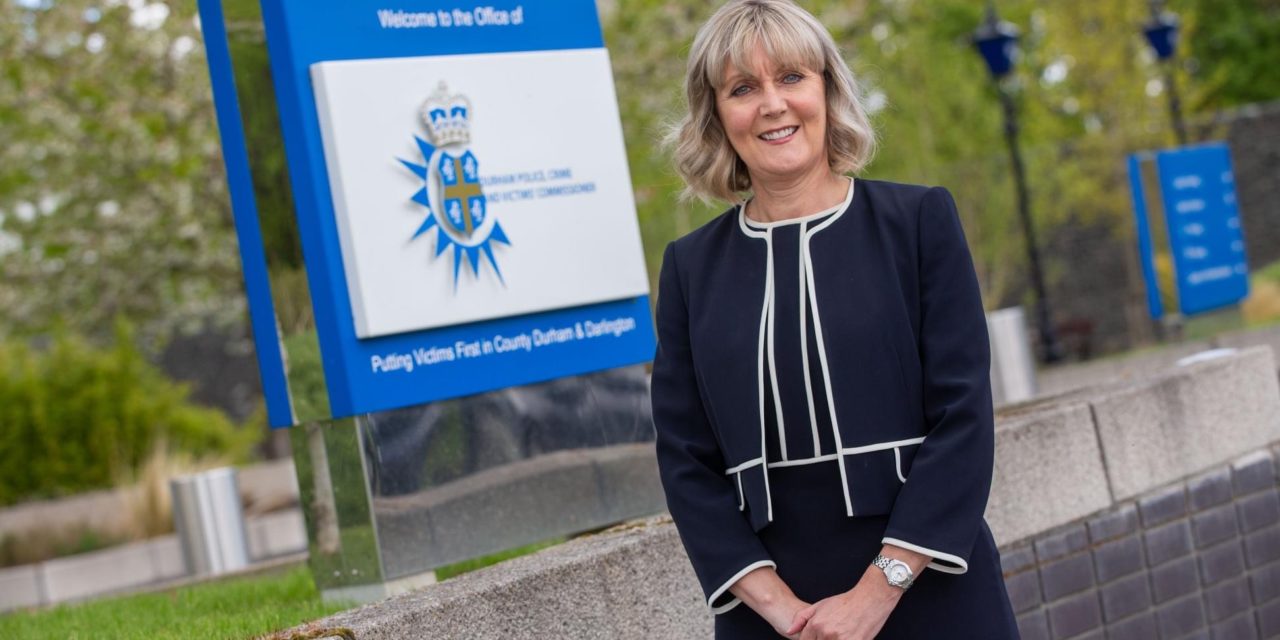Police and Crime Commissioner Joy Allen has reflected on her role to transform policing and secure effective justice for victims as she marks the first three months of her new term of office.
The County Durham and Darlington PCC, who had a resounding victory in May’s election, is working closely with key national decision makers to strongly influence change for the benefit of the people of Durham and beyond.
The Commissioner has accumulated a growing portfolio of national roles on behalf of the Association of Police & Crime Commissioners (APCC) including appointments as National Lead for drink/drug driving, Addiction & Substance Misuse and as the APCC Lead for Environment and Sustainability.
She has also taken on a new responsibilities as joint Lead for the APCC’s Finance portfolio. This follows a sustained campaign, highlighting the inadequacy of the current police funding formula for forces with a low tax base to the present and previous governments.
Alongside funding, the PCC is working with the National Police Chiefs’ Council (NPCC) on the Comprehensive Spending Review and is making national representations for devolved powers to secure PCCs more levers to level up accountability, improve outcomes for victims and improve the effectiveness of policing, crime and justice across England and Wales.
During the first three months of her current term, she has had several ministerial meetings and has worked alongside national partners to influence reform including the British Medical Association (BMA) which saw her address medical experts at a national BMA conference in London calling on the government to cut the drink-driving limit.
In her work to tackle drink and drug driving, she is fully supporting a local campaign brought by Shalorna Warner, whose eight-month-old son Zackary Blades and sister Karlene Warner, were killed when a drink driver hit the car she was driving on the A1 (M) in the early hours of 31st May.
Ms Warner is fighting to ensure those responsible for fatal drink or drug drive crashes face a lifelong driving ban – and has launched a petition to secure 100,000 signatures to get the issue heard in Parliament.
Locally, the PCC is preparing to consult on her new Police and Crime Plan 2024-28 which will focus heavily on tackling alcohol and drug-related crime and anti-social behaviour (ASB) and other key issues the public have told her are important. Alcohol is now a factor in almost half of all domestic abuse incidents and 30% of all violent crime while almost one fifth of all road deaths are caused by drink driving. National figures also show more than half of all homicides are related to drugs.
Commissioner Allen said: “It has been an extremely busy three months for my office. The past fortnight has been incredibly challenging as we have responded to the outbreaks of violent disorder sweeping the country.
“These incidents and the stirring up of hatred online have consumed significant policing and emergency resources and I have been impressed with the exceptional courage and fortitude of our officers in keeping our communities safe.
“These clashes have illuminated the strong and effective partnerships in place across the Durham force area, with all agencies standing united to confront this inexcusable behaviour and restore peace and safety to our streets.
“The violence has undoubtedly taken priority over the past two weeks, however, I am pleased to report progress in other areas of my work to tackle reoffending and improve trust and confidence in policing.
“Following confirmation that more prisoners will be subject to early release to ease prison overcrowding, I have written to the Minister for Justice and the Home Secretary calling for better resettlement packages to deter reoffending. Far too many prisoners are being released on licence without any practical support and this has to change if we are to alleviate the root of the problems and not just heap additional pressure on police forces and other agencies.”
The Commissioner also highlighted the recent implementation of the Right Care, Right Person model to alleviate demand pressures on policing by preventing call outs to mental health incidents that would be more appropriately responded to by suitably trained health professionals
The PCC said the move was an important step forward in improving the care of people in crisis throughout England and Wales but warned that more work was needed to free up frontline capacity so that police could focus more of their time on investigating and cutting crime.
In other areas of progress, the PCC, Durham Constabulary and Durham University have signed a Memorandum of Understanding (MoU) to work together for the benefit of local communities.
The institutions are already working together to promote safety and the economic development of the area. The MoU formalises the relationship for the benefit of future collaboration opportunities including those aimed at developing new technologies and delivering further academic research.
Furthermore, in July, the Commissioner’s Victim Care and Advice Service (VCAS) received national recognition for effective and ‘sophisticated’ victim care after securing the coveted Victims Choice Quality Mark accreditation.
The service, which was brought in-house by the Commissioner during her first term, was badged as an example of best practice nationally, with the extent of the specialist expertise available within the team described as ‘remarkable’.
The PCC has also travelled the length and breadth of the Force area meeting residents, businesses, landowners and farmers and rural communities to listen to their concerns and represent their voice in her national and local advocacy work.
She is a current board member for the North East Business Resilience Centre and works closely with the organisation to help businesses protect themselves from the threat of online fraud. The PCC is also a board member for the Blue Light Commercial Board, helping police forces and their suppliers develop action plans to make a positive impact on the local environment and economy.
PCC Joy Allen Reflects On Her Role










